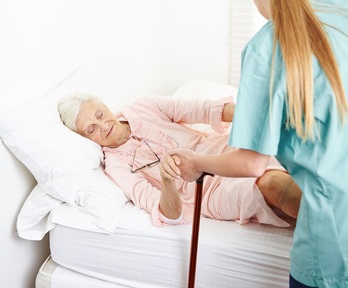Universities in England to get £15m to spend on simulated training for nurses
The government has announced it is giving universities in England £15m to spend on expanding their simulated learning for nurses, as well as £10m for a new nationally recognised critical care qualification.
 £15 million of the funding will go to universities to invest in new simulated training facilities and technology such as virtual reality (VR) technology, manikins, role play, and smart phones, tablets or computers, allowing nursing students to practise their clinical skills in a safe environment.
£15 million of the funding will go to universities to invest in new simulated training facilities and technology such as virtual reality (VR) technology, manikins, role play, and smart phones, tablets or computers, allowing nursing students to practise their clinical skills in a safe environment.
They will be able to train themselves on clinical procedures and simulate a realistic clinical setting with support from experienced colleagues. The investment comes after the Nursing and Midwifery Council announced up to 300 of the 2,300 clinical practice hours nurses need to complete during their degree can now be completed in simulated environments, due to the pandemic.
Minister for Care Helen Whately said: “We are committed to training more nurses for the NHS and supporting professional development, and this £25 million investment will provide more innovative training opportunities for nurses.
“Whilst there is no substitute for face to face training on wards, simulated training is a vital part of the curriculum and provides a safe space for students to develop their skills. Thanks to our investment, more nursing and other healthcare students will be able to benefit from the latest innovations and new technologies to better support their learning at this time.”
Alongside this, the government will also invest £10 million to develop a new, nationally recognised, critical care qualification for qualified nurses, which can also be accessed by a number of Allied Health professions. This will be rolled out for immediate use during the pandemic to help boost the number of people able to work in critical care.
Ms Whately added: “The funding will also recognise our critical care nurses, who have played a crucial role during this pandemic, with a new nationally recognised qualification.”
Professor Mark Radford, chief nurse at Health Education England welcomed the support on simulation hours from the NMC, which he said “will build on universities’ existing expertise in the education of healthcare workers for the NHS and social care”.
Increasing simulation hours and training facilities will help reduce the pressures on clinical placement capacity across the NHS and social care during the pandemic, and help students get the training they need to qualify and join the workforce, according to the Department for Health and Social Care.
Matthew McClelland, executive director of Strategy & Insight at the Nursing and Midwifery Council, said: “We’re committed to supporting our students and professionals during the challenges and workforce pressures posed by the pandemic.
“That’s why we introduced our recent, temporary Covid-19 recovery standard, which provides greater flexibility for educators to use simulated learning where nursing students aren’t able to go into or experience practice placements in the usual way.
“I really welcome this announcement by the Government, which will support education institutions in England to innovate and invest in simulation and will also help to expand the critical care workforce.”
The £15 million funding will be provided via immediate grant allocations to universities to help to rapidly expand student nurse simulated learning from this year.
More detail will be published on the qualification in due course.
Latest News
 29-Jul-24
Dementia Bus gives carehome.co.uk staff insight into life with dementia
29-Jul-24
Dementia Bus gives carehome.co.uk staff insight into life with dementia
 01-Mar-24
Find out the top care homes in 2024
01-Mar-24
Find out the top care homes in 2024
 21-Mar-23
UK's top care homes in 2023 revealed
21-Mar-23
UK's top care homes in 2023 revealed
 03-Jan-23
carehome.co.uk launches free care helpline
03-Jan-23
carehome.co.uk launches free care helpline
 13-Dec-22
5 mins with Emily Whitehurst, chief operating officer for Constantia Healthcare
13-Dec-22
5 mins with Emily Whitehurst, chief operating officer for Constantia Healthcare